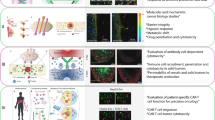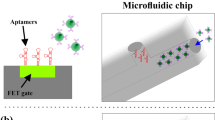Abstract
Functional precision medicine (FPM) has emerged as a new approach to improve cancer treatment. Despite its potential, FPM assays present important limitations such as the number of cells and trained personnel required. To overcome these impediments, here we describe a novel microfluidic platform that can be used to perform FPM assays, optimizing the use of primary cancer cells and simplifying the process by using microfluidics to automatize the process.
Access this chapter
Tax calculation will be finalised at checkout
Purchases are for personal use only
Similar content being viewed by others
References
Letai A (2017) Functional precision cancer medicine-moving beyond pure genomics. Nat Med 23:1028–1035
Letai A, Bhola P, Welm AL (2022) Functional precision oncology: testing tumors with drugs to identify vulnerabilities and novel combinations. Cancer Cell 40:26–35
Van De WM, Francies HE, Francis JM et al (2015) Prospective derivation of a living organoid biobank of colorectal cancer patients. Cell 161:933–945
Byrne AT, Alférez DG, Amant F et al (2017) Interrogating open issues in cancer precision medicine with patient-derived xenografts. Nat Rev Cancer 17:254–268
Snijder B, Vladimer GI, Krall N et al (2017) Image-based ex-vivo drug screening for patients with aggressive haematological malignancies: interim results from a single-arm, open-label, pilot study. Lancet Haematol 4:e595–e606
Kornauth C, Pemovska T, Vladimer GI et al (2022) Functional precision medicine provides clinical benefit in advanced aggressive hematologic cancers and identifies exceptional responders. Cancer Discov 12:372–387
Garcia JS, Bhatt S, Fell G et al (2020) Increased mitochondrial apoptotic priming with targeted therapy predicts clinical response to re-induction chemotherapy. Am J Hematol 95:245–250
Cetin AE, Stevens MM, Calistri NL et al (2017) Determining therapeutic susceptibility in multiple myeloma by single-cell mass accumulation. Nat Commun 8:1613
Stockslager MA, Malinowski S, Touat M et al (2021) Functional drug susceptibility testing using single-cell mass predicts treatment outcome in patient-derived cancer neurosphere models. Cell Rep 37:109788
Manzano-Muñoz A, Yeste J, Ortega MA et al (2022) Microfluidic-based dynamic BH3 profiling predicts anticancer treatment efficacy. NPJ Precis Oncologia 6:90
Competing Interests
JM is co-inventor of dynamic BH3 profiling (patented by Dana-Faber Cancer Institute) and has received royalties, was a paid consultant for Oncoheroes Biosciences and Vivid Biosciences, is an unpaid board member for the Society for Functional Precision Medicine, and is currently collaborating with AstraZeneca. JR-A and MAO are co-founders of Vitala Technologies and have stocks in the company; JR-A is Scientific Board member and MAO is a full-time employee in the company. No other relevant competing interests were disclosed by the other authors.
Funding
Ramon y Cajal Programme, Ministerio de Economia y Competitividad grant RYC-2015-18357 (JM).
Ministerio de Ciencia, Innovación y Universidades grant RTI2018–094533-A-I00 (JM).
CELLEX foundation (JM, AM).
Beca Trienal Fundación Mari Paz Jiménez Casado (JM)European Research Council, grant ERC-StG-DAMOC 714317 (JR-A).
European Research Council, H2020 EU framework FET-open BLOC 863037 (JR-A).
Spanish Ministry of Economy and Competitiveness, “Severo Ochoa” Program for Centers of Excellence in R&D SEV-2020-2023 (JR-A).
Generalitat de Catalunya. CERCA Programme 2017-SGR-1079 (JR-A, JS).
Fundación Bancaria “la Caixa” – Obra Social “la Caixa” (project IBEC-La Caixa Health Ageing) (JR-A).
Networking Biomedical Research Center (CIBER). CIBER is an initiative funded by the VI National R&D&i Plan 2008–2011, Iniciativa Ingenio 2010, Consolider Program, CIBER Actions, and the Instituto de Salud Carlos III (RD16/0006/0012), with the support of the European Regional Development Fund (JS).
Author information
Authors and Affiliations
Corresponding author
Editor information
Editors and Affiliations
Rights and permissions
Copyright information
© 2024 The Author(s), under exclusive license to Springer Science+Business Media, LLC, part of Springer Nature
About this protocol
Cite this protocol
Manzano-Muñoz, A., Yeste, J., Ortega, M.A., Samitier, J., Ramón-Azcón, J., Montero, J. (2024). A New Microfluidic Device to Facilitate Functional Precision Medicine Assays. In: Siciliano, V., Ceroni, F. (eds) Cancer Immunotherapy. Methods in Molecular Biology, vol 2748. Humana, New York, NY. https://doi.org/10.1007/978-1-0716-3593-3_8
Download citation
DOI: https://doi.org/10.1007/978-1-0716-3593-3_8
Published:
Publisher Name: Humana, New York, NY
Print ISBN: 978-1-0716-3592-6
Online ISBN: 978-1-0716-3593-3
eBook Packages: Springer Protocols




